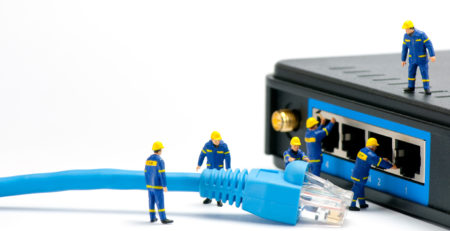Coronavirus will accelerate consolidation in vendor market
The S&P 500 Index fell 12% yesterday after a weekend full of bad news surrounding the coronavirus and its spread. This health crisis is rapidly turning into an economic crisis.
A lot can happen in three weeks
In a report published 3 weeks ago, MTN Consulting concluded that vigorous consolidation in the vendor market was likely for 2020:
“As enticing as 5G may be, many factors are holding back a telco capex surge right now, including supply chain issues surrounding China-U.S. trade and Huawei, as well as business model uncertainties around how telcos will monetize 5G. The rest of 2020 is likely to be challenging for vendors, as telcos continue to slim assets, share networks, deploy more software, embrace open networking, and delay or downsize major network upgrades pending a more certain investment climate…Add in the coronavirus, which is already impacting telecom supply chains, and 2020 is looking like a potentially bleak year for the vendors selling into the telco market.”
Since the “Bumpy road ahead for 5G transition” report was published, coronavirus has spread rapidly throughout the world. While several Asian countries have gotten it under control, the US, Canada, and most of Europe has shut down normal life to slow the spread and avoid healthcare system overload. In the US, the social distancing, quarantines and curfews that initially seemed like short-term necessities are now looking like they may be long-term solutions until a workable vaccine is produced. Everyone is being encouraged to work from home (WFH), and students are being forced into online learning as schools close. This is unprecedented. As author Stephen King tweeted yesterday, “This is going to change America, long-term.”
Stay healthy, keep your company afloat, and prepare for the long term
Given the highly contagious element of coronavirus and its relatively high mortality rate, everyone should be first and foremost concerned with health and safety issues. But business leaders also need to keep their eyes on the horizon, to consider how their companies can escape this crisis afloat and prosper in the long run.
As coronavirus lingers, both telecom operators and their suppliers are going to see demand erosion. This could be severe in the next 6-12 months. Many companies in telecom will struggle to survive during this period, even with government stimulus. It’s hard to know how bad it will get. As a NYSE trader said yesterday, “It’s very hard to model what that real impact is going to be… because it’s going to be very large.”
Based on current trends, a few things will likely happen to telecom in 2020:
- telco revenues will fall in most countries, along with consumer spending overall
- major telcos will layoff staff in the thousands
- telco capex will decline in 2020 by 5% at minimum
- mobile operators will stretch their 4G networks, and slow 5G network deployment rates
- telcos will actively lobby for state relief on multiple fronts, from subsidies to antitrust review of mergers to reimbursement for Chinese vendor rip and replace efforts
- Some governments, including the US, Canada and most of Europe, will consider massive stimulus projects in areas like physical infrastructure – in particular fiber construction – but most support will take 1-2 years to materialize
- China’s government will double down on state support for its tech sector
Based on this likely path, there will be severe pressure on many vendors selling into the telco market. That’s where M&A comes in.
Consolidation will pick up once markets stabilize
MTN Consulting tracks quarterly revenues for over 100 vendors, with a focus on those selling into the telecom network operator (TNO, or telco) market. As part of this, we track entry and exit into the market, as well as M&A among vendors. In the telecom vendor space, M&A is an ongoing reality – a way to enter new markets, and to improve your cost position. Huawei’s nonstop growth has added pressure on others to team up, as with Nokia’s 2015-6 acquisition of Alcatel-Lucent. Even though M&A often fails, it often appears to be the only option for a company under pressure.
Looking ahead to 2020, a number of vendors will be hit hard by the inevitable downturn facing the telecom market. Those vendors most at risk are the ones highly leveraged to the telco market, as telco spending may take a deep cut in 2020. Other signs of vulnerability include relatively low operating margins, limited cash reserve, and/or high debt loads. Some of the companies that have weak spots going into the coronavirus downturn are shown in Table 1, below. Potential problem areas are shaded red.
Table 1: Select telecom vendors and their financial position as of 4Q19
| Company | 4Q19 revenue (M) | Currency | Telco/total revenues | Operating margin | Cash months of opex | Net debt to Revenue* |
| Adtran | 116.0 | USD | 100% | -12.1% | 2.47 | (0.71) |
| Aviat Networks | 56.0 | USD | 47% | -1.8% | 2.00 | (0.52) |
| Casa Systems | 113.0 | USD | 100% | 8.8% | 3.32 | 1.58 |
| Ceragon Networks | 286.0 | USD | 80% | 2.8% | 0.26 | (0.03) |
| CommScope Holding | 2,299.0 | USD | 82% | -14.7% | 0.68 | 4.02 |
| Infinera | 385.0 | USD | 87% | -15.6% | 0.73 | 0.65 |
| Kudelski | 208.0 | USD | 48% | -0.5% | 1.77 | 1.87 |
| Ribbon Communications | 161.0 | USD | 71% | 13.0% | 0.96 | 0.09 |
| Technicolor | 1,033.0 | Euro | 51% | -0.1% | 0.23 | 1.18 |
Sources: FT, MTN Consulting
*Net debt = total debt minus cash & short term investments.
Several companies in Table 1 face a challenging 2020. Two are US-based companies still recovering from major acquisitions, CommScope Holding (ARRIS) and Infinera (Coriant). These vendors focus on connectivity/cabling and optical transmission, respectively. The other two, Kudelski and Technicolor, are European companies with exposure to the media segment and cable television, in particular. In addition, several of the companies in Table 1 are highly exposed to a single product market within the telecom space: microwave for Ceragon and Aviat, access for Adtran and Casa. Diversification can help in a downturn.
Telecom’s two biggest (publicly traded) vendors are not included in Table 1. Nokia is probably the subject of the most M&A rumors nowadays, due to a relatively slow start in 5G commercial rollouts. Nokia benefits from its US ties, though, as well as its good position outside the telco vertical, in transport, energy and government networks. By contrast, Ericsson gets almost all its revenues from telcos, and has bet big on a quick 5G uptake. Given both companies’ broad exposure to telco spending, though, 2020 will be a jittery year for both vendors.
–











